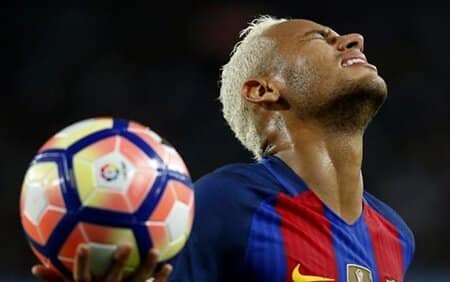IN March, Neymar singlehandedly orchestrated one of the great Champions League comebacks. Barcelona had no right to come back from a 4-0 first leg deficit against Paris Saint-Germain.
Instead, the Brazilian scored two goals and grabbed an assist in seven minutes. It was astonishing and Neymar described it as his best performance ever. The next morning, Neymar woke to read the papers. On the front page: Lionel Messi.
That, according to fresh media reports, was the exact moment Neymar decided enough was enough – he had to leave Barcelona to step out of the shadows of arguably the greatest player to grace our sport.
“The enduring image of a historic night was Messi,” wrote The Guardian’s Spanish football expert Sid Lowe.
“With Barça it almost always is and maybe there is something in that? The argument most consistently put forward for Neymar’s decision to leave for PSG is that he believes it is time to stand alone.”
He added: “At the Parc des Princes, success will be his own; PSG will be his team, players brought to his specifications and he will be surrounded by his people, friends and countrymen.”
“Neymar has played Barça with his soap opera with PSG, the team against which he probably scored his best game as Barca,” wrote Spanish daily El Pais.
“That famous comeback ended with Messi on a billboard in the north goal of the stadium, fist in high, worshiped by the fans of the Camp Nou.
“Maybe that was when Neymar realized that he would never reach the glory, even on the nights of his greatest success, as long as he aligned with Leo.”
Neymar has, in his four seasons with the Catalan giants, played second fiddle to the Argentine master.
When Luis Suarez arrived to create what could be the greatest ever attacking trio, Neymar’s attacking role shifted from goalscorer to provider for the other parts of MSN.
Shunted out to the left and forced into defensive responsibilities to cover for Messi, El Pais also argued that Neymar craved the free central attacking role he is granted with Brazil.
“Although Neymar and his entourage have not yet revealed their precise motives, the general belief is that he is no longer content to play second fiddle to Messi,” wrote the BBC’s Spanish football writer Andy West.
“At the prime age of 25, with a potentially career-defining World Cup on the horizon, he has opted to join a club who will make him the centre of attention, both on and off the pitch.”
It seems almost inevitable that Neymar would seek to leave to fulfil his ambitions of being the world’s best player – a dream that South American football expert Tim Vickery traced all the way back to the 25-year-old watching his boyhood idol Robinho fail to live up to his potential at Real Madrid.
Yet what Spanish football scribe Graham Hunter questions is Barcelona’s inability to see the future and plan for the day Neymar decided to leave.










